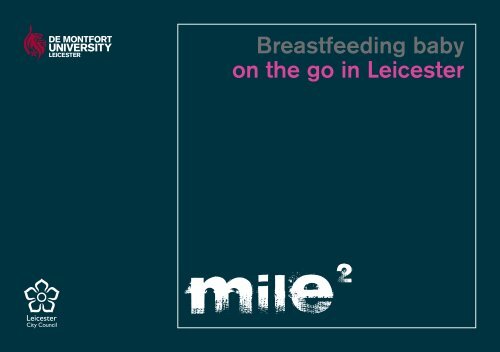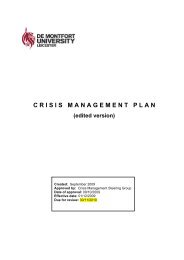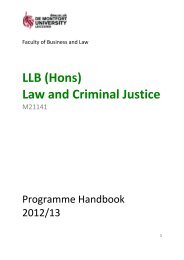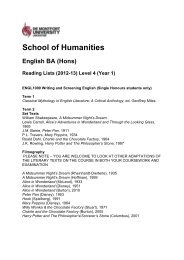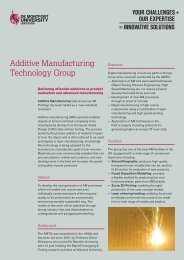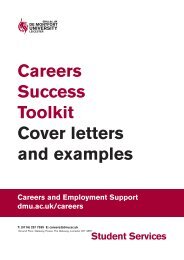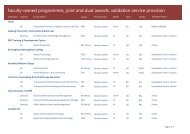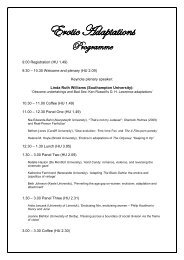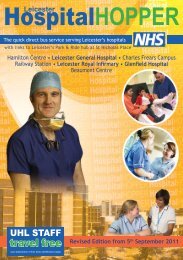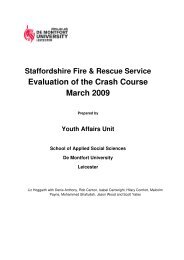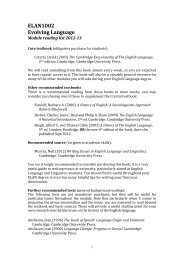You are welcome to breastfeed here - De Montfort University
You are welcome to breastfeed here - De Montfort University
You are welcome to breastfeed here - De Montfort University
Create successful ePaper yourself
Turn your PDF publications into a flip-book with our unique Google optimized e-Paper software.
Breastfeeding baby<br />
on the go in Leicester
Introduction<br />
We all know that <strong>breastfeed</strong>ing is the best way <strong>to</strong> ensure our<br />
children grow up healthy but that it can be difficult sometimes<br />
when out and about with a baby. <strong>You</strong> need <strong>to</strong> know w<strong>here</strong><br />
you can go and w<strong>here</strong> you will be <strong>welcome</strong> and supported <strong>to</strong><br />
<strong>breastfeed</strong>.<br />
This handy booklet was designed <strong>to</strong> provide you with this<br />
information and <strong>to</strong> support you in successfully breast feeding<br />
for longer.<br />
Created by student midwives at <strong>De</strong> <strong>Montfort</strong> <strong>University</strong><br />
<strong>to</strong>gether with staff, Squ<strong>are</strong> Mile residents, midwives, health<br />
visi<strong>to</strong>rs, and community groups, this booklet contains tips<br />
for successful <strong>breastfeed</strong>ing, information about local and<br />
national <strong>breastfeed</strong>ing support networks and a list of local<br />
shops and businesses, which provide useful facilities for<br />
mothers.<br />
We do hope you find the information included in this booklet<br />
useful and would <strong>welcome</strong> any comments you would like <strong>to</strong><br />
make.<br />
We wish you every success in <strong>breastfeed</strong>ing your baby on<br />
the go.<br />
The Breastfeeding baby on the go project team<br />
A Squ<strong>are</strong> Mile initiative dmu.ac.uk/mile2<br />
Contents:<br />
3. What <strong>are</strong> the benefits of <strong>breastfeed</strong>ing?<br />
6. How <strong>breastfeed</strong>ing works<br />
14. Ten <strong>to</strong>p tips for <strong>breastfeed</strong>ing success<br />
16. Leaving your baby when <strong>breastfeed</strong>ing<br />
20. Giving something back –<br />
donating breast milk<br />
22. Trouble shooting<br />
24. Local and national <strong>breastfeed</strong>ing support<br />
26. Local <strong>breastfeed</strong>ing facilities<br />
30. The UNICEF baby friendly initiative<br />
34. Breastfeeding baby on the go – <strong>to</strong>p 10<br />
websites for <strong>breastfeed</strong>ing advice<br />
2 3
What <strong>are</strong> the benefits of <strong>breastfeed</strong>ing?<br />
For baby…<br />
• Skin <strong>to</strong> skin contact at birth and a baby’s first<br />
<strong>breastfeed</strong> helps stabilise their blood sugar, protect<br />
their digestive system and gently eases the transition<br />
from the womb <strong>to</strong> the world<br />
• Breast milk is always ready in the right quantity and<br />
at the right temperature<br />
• The antibodies in breast milk protect baby from<br />
infection now and in later life, particularly from<br />
coughs, colds, ear and chest infections<br />
• <strong>You</strong>r baby will have less chance of being admitted<br />
<strong>to</strong> hospital for diarrhoea or gastroenteritis (s<strong>to</strong>mach<br />
upset)<br />
• A lower risk of cot death<br />
• Less chance of asthma, eczema, food allergies,<br />
diabetes, high blood pressure and obesity in<br />
later life<br />
• Babies love <strong>to</strong> <strong>breastfeed</strong>!<br />
4 We gratefully acknowledge the NCT in allowing us <strong>to</strong> use this information. Go <strong>to</strong> nct.org.uk for more details.<br />
5<br />
For you…<br />
• The first feed with your baby after birth is a great<br />
opportunity for a skin-<strong>to</strong>-skin cuddle<br />
• It helps your womb <strong>to</strong> contract back <strong>to</strong> normal size<br />
and helps minimise bleeding<br />
• <strong>You</strong> get <strong>to</strong> spend lots of time <strong>to</strong>gether getting <strong>to</strong><br />
know each other<br />
• It helps you get back in shape and can burn up <strong>to</strong><br />
500 calories a day<br />
• <strong>You</strong> never have <strong>to</strong> sterilize or make up bottles and<br />
you don’t have <strong>to</strong> carry so much equipment around<br />
when you go out<br />
• It is cheap. Formula milk can cost around £450 a<br />
year<br />
• <strong>You</strong>r baby is likely <strong>to</strong> be ill less often and you may<br />
not need <strong>to</strong> take your baby <strong>to</strong> the GP as frequently<br />
• <strong>You</strong> have a lower risk of breast and ovarian cancer<br />
later in life<br />
• <strong>You</strong> will feel immensely proud that you have been<br />
solely responsible for continuing <strong>to</strong> grow your baby<br />
and for giving them the very best start in life
How <strong>breastfeed</strong>ing works<br />
Myth: “Breastfeeding is more difficult than<br />
bottle-feeding”.<br />
Reality:<br />
Breastfeeding is not difficult but it can sometimes take<br />
time, patience and support <strong>to</strong> get right. If women find<br />
<strong>breastfeed</strong>ing difficult, it is usually because they have<br />
not had the right support <strong>to</strong> get off <strong>to</strong> a good start. Once<br />
you get going it is much easier than bottle-feeding.<br />
<strong>You</strong> and your baby <strong>are</strong> a unique and special pair,<br />
perfectly matched and designed <strong>to</strong> <strong>breastfeed</strong>. <strong>You</strong>r<br />
body begins <strong>to</strong> prep<strong>are</strong> for <strong>breastfeed</strong>ing in pregnancy<br />
and from about the 28th week of pregnancy, your<br />
breasts will start <strong>to</strong> produce a clear, nourishing fluid<br />
called colostrum. Many women don’t even notice they<br />
have it because it is produced in such small amounts,<br />
but it is t<strong>here</strong>. Colostrum is very important because<br />
it provides baby with exactly the right mixture of fats,<br />
proteins, vitamins and antibodies for the first feed.<br />
As soon as your baby is born, he or she will want<br />
<strong>to</strong> <strong>breastfeed</strong>. Most babies will have their first feed<br />
within an hour of birth and this is ideal for getting your<br />
<strong>breastfeed</strong>ing off <strong>to</strong> a good start. Having a skin-<strong>to</strong>skin<br />
cuddle <strong>to</strong>gether for as long as you need, will help<br />
as it stimulates babies <strong>to</strong> want <strong>to</strong> feed and it helps<br />
you <strong>to</strong> produce oxy<strong>to</strong>cin and prolactin, the hormones<br />
responsible for making and letting down milk.<br />
As your baby suckles at the breast, a combination of<br />
these sucks and your hormones cause the milk <strong>to</strong> be<br />
released from the reservoirs w<strong>here</strong> it is s<strong>to</strong>red and<br />
squeeze it down, through the milk ducts and out of<br />
your nipple in<strong>to</strong> your baby’s mouth. As your breasts<br />
empty, the bundles of special milk producing cells<br />
start <strong>to</strong> create more milk and fill the reservoirs again in<br />
preparation for the next feed.<br />
For the first three or four days you will continue <strong>to</strong><br />
produce colostrum in small amounts. This is plenty <strong>to</strong><br />
start with, as babies have very tiny s<strong>to</strong>machs that can<br />
only hold about a teaspoon at a time. As your baby<br />
feeds more and more frequently and starts <strong>to</strong> need<br />
larger amounts, the colostrum will change <strong>to</strong> milk and<br />
you will start <strong>to</strong> produce more. The more your baby<br />
feeds, the more milk you will make. If you need <strong>to</strong> make<br />
more milk for baby at any point, just feed more often.<br />
It is important that babies <strong>are</strong> allowed <strong>to</strong> feed for as<br />
long as needed because the first part of the feed is rich<br />
in healthy sugars and the later part is rich in fats and<br />
proteins. Babies need all of these <strong>to</strong> thrive.<br />
<strong>You</strong> don’t need <strong>to</strong> give your baby anything else until<br />
they <strong>are</strong> six months old because your milk will provide<br />
absolutely everything your baby needs. After this time<br />
you may like <strong>to</strong> think about weaning. Although many<br />
mothers may choose <strong>to</strong> give a bottle before this time<br />
and will continue <strong>to</strong> successfully <strong>breastfeed</strong>, introducing<br />
formula milk can make <strong>breastfeed</strong>ing more difficult. For<br />
this reason we recommend exclusively <strong>breastfeed</strong>ing<br />
your baby for the first six months of life.<br />
6 7
Successfully attaching your baby at the breast<br />
8 9
What is colostrum?<br />
Myth: “<strong>You</strong> will not have any milk for the first 3 or 4<br />
days after birth”.<br />
Reality:<br />
In the first few days you will produce tiny amounts<br />
of very rich, nourishing milk called colostrum. Baby<br />
doesn’t need much, which is why you don’t see much<br />
of it, but it is the perfect first baby food.<br />
Colostrum is a sticky yellow or white substance<br />
produced by the breast before the milk comes in<br />
usually on day three or four. It is low in fat and high in<br />
carbohydrates, protein and antibodies <strong>to</strong> help keep<br />
your baby healthy. Even if you decide not <strong>to</strong> <strong>breastfeed</strong>,<br />
giving your baby colostrum for the first three <strong>to</strong> four days<br />
after birth is essential <strong>to</strong> give him or her the best<br />
start in life.<br />
Benefits of colostrum<br />
• Easy <strong>to</strong> digest<br />
• Has a laxative effect, which helps healthy bowel<br />
movements in your baby<br />
• Helps prevent jaundice (yellowing of skin)<br />
• Contains infection fighting cells which help destroy<br />
disease causing bacteria and viruses<br />
• Contains an antibody called immunoglobulin A that<br />
protects your baby from lung, intestine and throat<br />
infections.<br />
Is your baby getting enough?<br />
Due <strong>to</strong> the small quantity of colostrum, mothers often<br />
feel that it isn’t enough for their baby. However this<br />
is NOT true! Colostrum is measurable in teaspoons<br />
rather than ounces but this is all a baby needs for the<br />
first few days of life. Research has found that a day old<br />
newborn’s s<strong>to</strong>mach does not stretch <strong>to</strong> hold more than<br />
this.<br />
The size of your baby’s tummy<br />
Size of a shooter marble<br />
Day 1 Day 3 Day 7<br />
5-7mls 20-25mls 60-80mls<br />
Size of a ping pong ball<br />
What is breast milk?<br />
Size of an extra large<br />
chicken egg<br />
Breast milk is a thin, white, living substance that is produced around the third or fourth day after birth and is<br />
individual <strong>to</strong> your baby’s needs. It contains over 100 ingredients, many of which enhance your baby’s immune<br />
system and cannot be replicated by formula milk.<br />
Immunoglobulins, a type of antibody, <strong>are</strong> found in breast milk and help support your baby’s immune system.<br />
Research has found that stem cells, which <strong>are</strong> found in breast milk, can act as an ‘internal repair system’ helping<br />
your baby <strong>to</strong> recover more quickly from illness.<br />
Breast milk also contains carbohydrates, protein, vitamins and minerals in exactly the right quantity for your<br />
individual baby. <strong>You</strong>r body makes it slightly differently each time because it knows what your baby needs.<br />
10 11
Did you know?<br />
Some mothers use breast milk as a treatment for certain conditions, due <strong>to</strong> the antibodies found in it. Some<br />
research has found that putting a couple of drops of breast milk on the affected <strong>are</strong>a may be effective in treating:<br />
• Sticky eyes, also known as conjunctivitis, which is common in newborn babies<br />
• Sore or cracked nipples<br />
• Nappy rash<br />
• Ear infections<br />
• Sore throats and mouth sores<br />
• Stuffy noses<br />
How is breast milk different from formula milk?<br />
Myth: “Modern formula milks <strong>are</strong> now so advanced that they <strong>are</strong> as good as breast milk”<br />
Reality:<br />
Formula milks <strong>are</strong> an inexact copy of breast milk made from cows milk and other additives. Breast milk contains<br />
living cells, enzymes and hormones that cannot be made or copied. Babies who <strong>are</strong> fed formula milk may miss<br />
out on these important ingredients. Formula milk is good at helping babies <strong>to</strong> grow and put on weight, but t<strong>here</strong> is<br />
much more <strong>to</strong> <strong>breastfeed</strong>ing than just helping the baby <strong>to</strong> grow.<br />
This table shows how breast milk and formula milk <strong>are</strong> different<br />
Breast Milk Formula Milk<br />
Fats Contains exactly the right kind of fats <strong>to</strong> help your baby’s<br />
growth and brain development.<br />
Carbohydrates Contains the perfect amount of lac<strong>to</strong>se and oligosaccharides<br />
(special sugars) that help protect your baby’s gut.<br />
Protein Has the right kind of protein in the right quantity that is soft<br />
and very easily digestible for your baby.<br />
Vitamins and minerals Perfectly balanced vitamins and minerals in the right<br />
amounts, which <strong>are</strong> easily absorbed, your baby will not get<br />
<strong>to</strong>o much or <strong>to</strong>o little.<br />
Protective fac<strong>to</strong>rs Rich in live white blood cells and antibodies, which help<br />
build and protect your baby’s immune system.<br />
Enzymes and hormones Rich in hormones and digestive enzymes, which help <strong>to</strong><br />
develop the gut and aid digestion.<br />
Cows milk does not contain all of the right fats so these <strong>are</strong><br />
often added <strong>to</strong> formula milk from fish oil. May lack some vital<br />
essential fats.<br />
No naturally occurring oligosaccharides and lower amounts<br />
of lac<strong>to</strong>se.<br />
Cows milk used <strong>to</strong> make formula is <strong>to</strong>o high in protein so<br />
it has <strong>to</strong> be adjusted by adding more carbohydrate. The<br />
protein in cows milk is not as easily digested by your baby.<br />
Contains more vitamins and minerals because your baby<br />
can’t absorb them as easily from formula milk. This makes<br />
digestion harder for your baby.<br />
Does not contain any live white blood cells or antibodies.<br />
Does not contain any hormones or digestive enzymes.<br />
12 13
10 <strong>to</strong>p tips for successful <strong>breastfeed</strong>ing<br />
Myth: “Bottle feeding helps other family members<br />
<strong>to</strong> bond with the baby because they get <strong>to</strong> help with<br />
the feeding”<br />
Reality:<br />
T<strong>here</strong> <strong>are</strong> lots of other ways for families <strong>to</strong> bond with the<br />
baby. Bathing, playing and cuddling <strong>are</strong> all important <strong>to</strong><br />
your baby’s growth and development. This combined<br />
with <strong>breastfeed</strong>ing will give your baby the best start in<br />
life.<br />
1. Feed your baby as soon as possible after birth, ideally<br />
within the first hour. This will get you off <strong>to</strong> a good start,<br />
stimulate <strong>breastfeed</strong>ing hormones and help your baby <strong>to</strong><br />
achieve a good latch.<br />
2. Feed your baby regularly and as often as he or she<br />
wants. This will ensure that you have a great milk supply<br />
and a satisfied baby.<br />
3. Make sure that feeding is comfortable and enjoyable.<br />
If it hurts <strong>to</strong> feed or if you have sore nipples, ask for help<br />
in latching your baby correctly <strong>to</strong> the breast.<br />
4. Understand how <strong>breastfeed</strong>ing works. This will help<br />
you <strong>to</strong> understand about supply and demand and how<br />
frequent feeding will make <strong>breastfeed</strong>ing easier for you<br />
and your baby.<br />
5. Breastfeed your baby at night. Prolactin, the hormone<br />
responsible for milk production is at its highest at night.<br />
Whilst it might seem preferable <strong>to</strong> let your baby sleep at<br />
night, continuing night feeds for as long as possible will<br />
maximise your milk supply.<br />
6. Don’t give your baby any artificial teats, pacifiers,<br />
nipple shields or formula milk. This can confuse your<br />
baby and affect your milk supply. In r<strong>are</strong> circumstances<br />
it may be necessary, but always talk <strong>to</strong> your midwife or<br />
health visi<strong>to</strong>r first.<br />
7. Rest. Breastfeeding and looking after a new baby can<br />
be hard work. Make time for rests and sleep when your<br />
baby sleeps during the day if you need <strong>to</strong>.<br />
8. Look after yourself. Breastfeeding can be hungry and<br />
thirsty work. Drink plenty of fluid and eat as well as you<br />
possibly can.<br />
9. Relax! This will help <strong>to</strong> make <strong>breastfeed</strong>ing easier and more enjoyable and your body will let down your milk more<br />
effectively.<br />
10. If you need <strong>to</strong> go back <strong>to</strong> work, talk <strong>to</strong> your employer. Employers have a legal responsibility <strong>to</strong> support<br />
<strong>breastfeed</strong>ing. This will include allowing you time <strong>to</strong> express your milk, somew<strong>here</strong> private <strong>to</strong> do it and a place <strong>to</strong><br />
safely s<strong>to</strong>re your milk at work.<br />
14 15
Leaving your baby when <strong>breastfeed</strong>ing<br />
Myth: “<strong>You</strong> can’t leave your baby when you <strong>are</strong><br />
<strong>breastfeed</strong>ing, it ties you down”<br />
Reality:<br />
During our busy lives it is not always possible <strong>to</strong> be<br />
with our babies for every second of the day and many<br />
mums decide <strong>to</strong> return <strong>to</strong> work, but still choose <strong>to</strong><br />
nourish their babies with breast milk. Expressing breast<br />
milk at regular intervals when away from your baby also<br />
helps maintain your milk supply. However it is ideal<br />
<strong>to</strong> wait around six weeks or until <strong>breastfeed</strong>ing is well<br />
established before expressing your milk and giving it <strong>to</strong><br />
your baby via a bottle.<br />
Hand expression<br />
<strong>You</strong> can express milk by hand effectively and quickly<br />
once you understand the technique and in the first few<br />
days it is easier <strong>to</strong> express milk by hand than with a<br />
breast pump. Hand expression is the best way <strong>to</strong> relieve<br />
full, engorged breasts as you can control how much you<br />
wish <strong>to</strong> express easily. <strong>You</strong> do not need <strong>to</strong> express a<br />
full feed, just expressing enough <strong>to</strong> relieve the fullness.<br />
Hand expression can also help <strong>to</strong> encourage a baby <strong>to</strong><br />
attach <strong>to</strong> the breast by giving them a taste of the milk.<br />
This can be incredibly useful when attaching a baby for<br />
a first feed after birth.<br />
How <strong>to</strong> hand express<br />
1. Make sure you <strong>are</strong> relaxed and in an environment<br />
w<strong>here</strong> you feel comfortable and will not be disturbed<br />
2. Massage your breast, all the way around <strong>to</strong> help<br />
stimulate the milk ducts<br />
3. Position your hand on the outer edge of the brown<br />
<strong>are</strong>a surrounding the nipple<br />
4. Using your thumb and index finger in a ‘c shape’,<br />
gently squeeze this <strong>are</strong>a – this shouldn’t hurt<br />
5. Release the pressure and repeat; you can try rolling<br />
the fingers down <strong>to</strong>wards the nipple with some<br />
gentle pressure, you should begin <strong>to</strong> see the milk. If<br />
you do not see any, try moving the position of your<br />
fingers, maybe closer <strong>to</strong> the nipple or further back<br />
6. When milk flow begins <strong>to</strong> slow or s<strong>to</strong>p, move on<strong>to</strong><br />
the other breast, if you <strong>are</strong> expressing <strong>to</strong> release<br />
engorgement s<strong>to</strong>p when this pressure subsides<br />
7. <strong>You</strong> can collect you breast milk in sterilized<br />
containers in the fridge for up <strong>to</strong> five days at 5ºC or<br />
lower, in the freezer compartment of a fridge for up<br />
<strong>to</strong> two weeks or in a deep freeze for six months<br />
Breast Pumps<br />
<strong>You</strong> can express milk by hand effectively and quickly.<br />
Using a breast pump is a convenient and practical<br />
way <strong>to</strong> express your breast milk. <strong>You</strong> can s<strong>to</strong>re it as<br />
described in step seven, above. T<strong>here</strong> <strong>are</strong> many different<br />
types of breast pump available but they <strong>are</strong> generally<br />
either manual or electric. Whichever kind you use you<br />
will need <strong>to</strong> make sure that you c<strong>are</strong>fully sterilize all<br />
your equipment. Ask your midwife or health visi<strong>to</strong>r if you<br />
would like help with this.<br />
Manual pumps <strong>are</strong> relatively cheap, light and portable;<br />
and require no electricity. They can however take some<br />
time <strong>to</strong> express a full breast and require some effort on<br />
the part of the user. They work by creating suction over<br />
the nipple and <strong>are</strong>ola. <strong>You</strong> then manually pump, using<br />
the handle attached <strong>to</strong> create a vacuum which mimics<br />
your baby’s sucking action that allows the milk <strong>to</strong> be<br />
removed from the breast and collected in the connected<br />
container.<br />
Advantages of manual pumps<br />
• The least expensive type of breast pump<br />
• Quiet <strong>to</strong> use<br />
• Quick <strong>to</strong> assemble<br />
• Easy <strong>to</strong> control<br />
• Some women describe that this type of pump feels<br />
more natural.<br />
16 17
Electric pumps can be purchased or even hired and<br />
<strong>are</strong> usually much more expensive than manual pumps,<br />
they can be heavier and larger, but <strong>are</strong> quicker and<br />
require little effort on behalf of the user. T<strong>here</strong> <strong>are</strong> two<br />
types of electric pumps: those that require batteries and<br />
those that can be plugged in<strong>to</strong> the mains.<br />
The newest electric pumps <strong>are</strong> quick and convenient<br />
and <strong>are</strong> designed <strong>to</strong> be portable. They <strong>are</strong> ideal for<br />
women wanting <strong>to</strong> express regularly and <strong>are</strong> especially<br />
suitable for women who want <strong>to</strong> return <strong>to</strong> work.<br />
Unlike a manual pump, once the cup is in place on the<br />
breast, the electric pump takes over.<br />
Advantages of electrical pumps<br />
• They <strong>are</strong> designed <strong>to</strong> replicate the baby’s sucking<br />
patterns<br />
• Increased number of sucks per minute as comp<strong>are</strong>d<br />
<strong>to</strong> a manual pump<br />
• Adjustable suction levels<br />
• Removes milk from the breast more quickly<br />
• May have fewer parts<br />
How <strong>to</strong> hand express<br />
1. Make sure you <strong>are</strong> relaxed and in an environment<br />
w<strong>here</strong> you feel comfortable and will not be disturbed<br />
Places <strong>to</strong> buy breast pumps around the local <strong>are</strong>a<br />
S<strong>to</strong>re Address Products Available<br />
Asda Fosse Park<br />
Narborough Road South<br />
Leicester<br />
LE3 2LL<br />
Tel: (0116) 281 5000<br />
Blackbird Pharmacy 8 Blackbird Road<br />
Leicester<br />
LE4 0FS<br />
Tel: (0116) 262 1350<br />
Boots Unit 38-39 Highcross Centre<br />
Leicester<br />
LE1 4FQ<br />
Tel: (0116) 262 4149<br />
John Lewis 2 Bath House Lane<br />
Highcross<br />
Leicester<br />
LE1 4SA<br />
Tel: (0116) 242 5777<br />
Shilchem Ltd. 217 Hinckley Road<br />
Leicester<br />
LE3 0TG<br />
Tel: (0116) 251 8779<br />
Avent - Manual<br />
Tommee Tippee - Closer <strong>to</strong> Nature<br />
Can order various types on request<br />
Medela – Mini Electric, Harmony, Swing or Freestyle<br />
Ameda – Lactaline<br />
Ardo – Calypso<br />
Tommee Tippee - Closer <strong>to</strong> nature<br />
Medela – Mini Electric, Harmony or Swing<br />
Avent – Manual, Electric and Twin Electric<br />
Avent – Manual<br />
These <strong>are</strong> just a few of the places that you can buy breast pumps in the local <strong>are</strong>a. Many local pharmacies do not<br />
s<strong>to</strong>ck breast pumps but will be happy <strong>to</strong> order them for you if you ask.<br />
18 19
Giving something back – donating breast milk<br />
Myth: “Poorly or premature babies cannot be<br />
breastfed”<br />
Reality:<br />
Breast milk is especially important for babies who<br />
<strong>are</strong> vulnerable, sick or premature. If your baby needs<br />
special c<strong>are</strong> after the birth, you will be encouraged and<br />
supported <strong>to</strong> express your milk <strong>to</strong> feed <strong>to</strong> your baby.<br />
Sometimes though, mothers may struggle <strong>to</strong> provide<br />
breast milk for their babies as they may be ill or under<br />
<strong>to</strong>o much stress <strong>to</strong> maintain their milk supply. By<br />
supplying donated breast milk, donor milk banks enable<br />
these mothers <strong>to</strong> provide this nutrition <strong>to</strong> their babies,<br />
enabling an increased risk of survival and long term<br />
development.<br />
Why is donating milk important?<br />
T<strong>here</strong> <strong>are</strong> currently 17 donor breast milk banks in the<br />
UK. Milk banks supply human breast milk free of charge.<br />
Breast milk is provided by a donor and given <strong>to</strong> those<br />
families who require it the most. This is of great benefit<br />
not only <strong>to</strong> the babies but their mothers as well. If you<br />
have a good supply of milk and <strong>are</strong> producing more than<br />
your baby needs, you can help by donating your breast<br />
milk.<br />
What do you need <strong>to</strong> be a donor?<br />
As a donor, you would need <strong>to</strong> be in good health and<br />
have a baby who is <strong>breastfeed</strong>ing and under six months<br />
of age. This ensures a good milk supply and that the<br />
milk has the correct nutritional content for premature<br />
babies. <strong>You</strong> would also need <strong>to</strong> be a non smoker, not be<br />
taking any medication, not drink more than two units of<br />
alcohol a day or take illegal drugs. Equipment such as<br />
pumps, bottles and labels <strong>are</strong> provided by the bank and<br />
you would need <strong>to</strong> s<strong>to</strong>re your milk at a temperature of<br />
below -20°C (-4°F) until a courier collects the milk and<br />
transports it <strong>to</strong> the ne<strong>are</strong>st bank.<br />
Is it safe?<br />
Yes. Donor milk banks very c<strong>are</strong>fully regulate the milk<br />
collected from donors <strong>to</strong> ensure that it is safe by<br />
screening all potential donors for infections that may be<br />
passed in<strong>to</strong> the breast milk. Donors <strong>are</strong> also questioned<br />
on their medical his<strong>to</strong>ry. Training and practical support<br />
is also given regarding milk expression, sterilization of<br />
equipment, s<strong>to</strong>rage and the transportation of breast milk.<br />
When the milk is collected, the milk bank safely s<strong>to</strong>res,<br />
heat-treats and tests it for contamination <strong>to</strong> ensure the<br />
quality and safety of donor breast milk.<br />
Are donors paid?<br />
No. Although milk banking is a very valuable service,<br />
donors <strong>are</strong> not compensated for the breast milk that is<br />
provided. The aim of the scheme is only <strong>to</strong> collect and<br />
process surplus milk that might otherwise be thrown<br />
away.<br />
Is the service confidential?<br />
Yes. Confidentiality of both the receiver and the donor<br />
<strong>are</strong> maintained. The donor will not be provided with<br />
information on who receives their milk however they may<br />
ask about basic information about how it is being used.<br />
What if I need <strong>to</strong> use donor breast milk?<br />
Donor breast milk can be provided <strong>to</strong> special c<strong>are</strong> baby<br />
units, transitional c<strong>are</strong> units and community settings. If<br />
your baby requires access <strong>to</strong> donor breast milk, you may<br />
talk <strong>to</strong> your health c<strong>are</strong> professional who can provide<br />
you with information on the services available in your<br />
<strong>are</strong>a. If you require general information regarding donor<br />
breast milk banking, or would like <strong>to</strong> donate your breast<br />
milk, you can find the contact details below. Full support<br />
will be provided <strong>to</strong> you and your family throughout this<br />
process.<br />
REMEMBER: Every drop of breast milk is valuable<br />
and those babies who <strong>are</strong> particularly vulnerable<br />
benefit from even the smallest amount of milk.<br />
Premature babies may only require 20 mls of breast<br />
milk per day <strong>to</strong> start with.<br />
UK Association for Milk Banking is a charity that aims <strong>to</strong><br />
provide support and information <strong>to</strong> donors and families<br />
needing donated breast milk<br />
W: ukamb.org E: info@ukamb.org T: (0208) 385 3559<br />
Address: UKAMB, The Milk Bank. Queen Charlotte’s<br />
and Chelsea Hospital, Du Cane Road,<br />
London, W12 0HS<br />
20 21
Trouble shooting<br />
Myth: “It is normal for <strong>breastfeed</strong>ing <strong>to</strong> hurt.”<br />
Reality:<br />
Whilst some women do experience some tenderness<br />
during the first few days this should be temporary and<br />
should never be so bad that you dread feeding your<br />
baby If you <strong>are</strong> experiencing pain of your breast or<br />
nipple. This is not normal and is usually due <strong>to</strong> the baby<br />
not latching properly. Make sure that you ask for help,<br />
because with the right help and advice it is r<strong>are</strong> that<br />
problems cannot be resolved.<br />
Nipple creams<br />
W<strong>here</strong> <strong>breastfeed</strong>ing is going well, t<strong>here</strong> is no need at<br />
all for you <strong>to</strong> use any kind of nipple cream. However,<br />
some women do report that they find it helpful if they <strong>are</strong><br />
tender in the first few days or w<strong>here</strong> the baby has not<br />
been attaching properly <strong>to</strong> the breast and their nipples<br />
have become sore or cracked. The most important<br />
solution <strong>to</strong> persistently sore or cracked nipples is <strong>to</strong> fix<br />
the problem with your baby’s latch. Cream will not solve<br />
this problem but may provide you with some comfort<br />
whilst you <strong>are</strong> receiving help from your midwife, health<br />
visi<strong>to</strong>r or lactation consultant.<br />
Some research has shown Lanolin cream is best as<br />
this is <strong>to</strong>xic and does not need <strong>to</strong> be removed before<br />
feeding. Alternative creams <strong>are</strong> available. Please talk <strong>to</strong><br />
your midwife or GP.<br />
Nipple shields <strong>are</strong> often recommended <strong>to</strong><br />
<strong>breastfeed</strong>ing women by friends and family in an attempt<br />
<strong>to</strong> reduce nipple pain or soreness and <strong>to</strong> help the baby<br />
attach <strong>to</strong> the breast. However, they do not help <strong>to</strong> solve<br />
the problem long-term and may even make things worse<br />
as they can confuse your baby’s natural instinct <strong>to</strong> latch<br />
on<strong>to</strong> the breast and reduce your milk flow.<br />
For this reason they <strong>are</strong> not recommended in normal<br />
circumstances. T<strong>here</strong> <strong>are</strong> r<strong>are</strong> instances w<strong>here</strong> they<br />
can be helpful but one <strong>to</strong> one <strong>breastfeed</strong>ing support is<br />
always preferable. If you <strong>are</strong> considering using them,<br />
we would recommend speaking with your midwife,<br />
health visi<strong>to</strong>r or lactation consultant first. Ensure that<br />
your nipple shields <strong>are</strong> properly sterilized and that you<br />
observe your baby <strong>to</strong> ensure that he or she continues <strong>to</strong><br />
feed well and gain weight.<br />
Thrush is caused by a fungus called candida albicans.<br />
Most of us carry it naturally in our bodies and it does not<br />
cause a problem. Occasionally it can grow unchecked<br />
and cause an infection if the baby’s mouth, on your<br />
breast or both because thrush thrives in warm moist<br />
environments. If it is not treated you can pass it back<br />
and forth between you. Thrush can cause burning<br />
nipples, stabbing breast pain, shiny, hot, red or flakey<br />
nipples and a characteristic white coating <strong>to</strong> the baby’s<br />
<strong>to</strong>ngue, inside the cheeks and the roof of the mouth<br />
which is different <strong>to</strong> the white ‘milk fur’ which commonly<br />
coats the baby’s <strong>to</strong>ngue. Thrush may be more likely <strong>to</strong><br />
develop if you <strong>are</strong> already sore.<br />
Mastitis is a condition that affects around one in 10<br />
<strong>breastfeed</strong>ing mothers at some point. It is caused by<br />
milk becoming backed up in the milk ducts because<br />
your baby is not emptying your breasts properly either<br />
because the baby is not latching on properly or because<br />
you <strong>are</strong> producing more milk than is needed. It causes<br />
your breasts <strong>to</strong> become hot, inflamed, red and sore and<br />
you may also notice swollen lumps in the breast tissue<br />
caused by milk that has leaked from the milk ducts. It<br />
may cause you <strong>to</strong> have flu like symp<strong>to</strong>ms, feel hot and<br />
cold or have a temperature.<br />
The most important thing is not <strong>to</strong> s<strong>to</strong>p feeding. Most<br />
mastitis will resolve naturally with frequent feeds (w<strong>here</strong><br />
the baby is properly latched), gentle massage of the<br />
affected <strong>are</strong>a <strong>to</strong> ensure that it empties properly and<br />
warm compresses. If it does not resolve within 24<br />
hours, or becomes worse, it is important <strong>to</strong> seek help<br />
as mastitis can become infected and may be serious<br />
if left untreated. Talk <strong>to</strong> your midwife or GP if you <strong>are</strong><br />
concerned.<br />
Engorgement<br />
This usually occurs within the first week following<br />
birth and is usually caused by the milk ‘coming in’ as it<br />
changes from colostrum and increases in volume. It can<br />
cause, your breasts <strong>to</strong> feel hot, hard, lumpy, sensitive<br />
and uncomfortable. It doesn’t happen <strong>to</strong> every woman,<br />
many just describe feeling ‘full’. If it does happen <strong>to</strong> you,<br />
don’t worry it will pass, usually within a few days. <strong>You</strong><br />
can help by ensuring that you feed your baby frequently<br />
and for as long as he or she wants, wear a comfortable<br />
and supportive bra even at night and ensure that your<br />
baby is latching on correctly.<br />
Growth spurts<br />
From time <strong>to</strong> time, when you <strong>are</strong> <strong>breastfeed</strong>ing, your<br />
baby may have a ‘growth spurt’. This may make your<br />
baby want <strong>to</strong> feed very frequently perhaps every 2 hours<br />
or more for a period of 24 – 48 hours. This is because<br />
your baby now needs a greater volume of milk than you<br />
<strong>are</strong> currently making and he or she wants you <strong>to</strong> make<br />
more. By feeding frequently your baby gives your body<br />
the extra stimulation, it needs <strong>to</strong> do this. This is normal<br />
<strong>breastfeed</strong>ing behaviour. Whilst it can be tiring for you<br />
it will soon resolve and your baby will return <strong>to</strong> a normal<br />
pattern once your supply has increased, which usually<br />
takes no more than 48 hours. Try not <strong>to</strong> be tempted <strong>to</strong><br />
supplement with formula feeds because you will reduce<br />
the vital amount of stimulation you will get and it may be<br />
difficult <strong>to</strong> catch up.<br />
22 23
Local and national <strong>breastfeed</strong>ing support<br />
This section gives the details and contact<br />
information for places that you can access<br />
<strong>breastfeed</strong>ing support and advice<br />
Sure Start Children’s Centres support families in the<br />
local community - through all stages of pregnancy<br />
and from the birth of your baby until the child is 12<br />
years old. They aim <strong>to</strong> promote the best possible<br />
start in life for every child:<br />
• Trained staff organise activities and services, from<br />
health education <strong>to</strong> childc<strong>are</strong> and family support<br />
• Most services and sessions <strong>are</strong> free<br />
• All centres <strong>are</strong> checked and inspected by Ofsted <strong>to</strong><br />
ensure good quality c<strong>are</strong> and service provision<br />
• Most centres have a book library, <strong>to</strong>y library, stay<br />
and play sessions and a small café<br />
T<strong>here</strong> <strong>are</strong> three Sure Start Children’s Centres in your<br />
local <strong>are</strong>a: New Parks, Brauns<strong>to</strong>ne Frith and the West<br />
End. They all run baby and <strong>breastfeed</strong>ing support<br />
groups and have a variety of facilities available <strong>to</strong><br />
mothers.<br />
Breastfeeding support groups provide:<br />
• A chance <strong>to</strong> meet with healthc<strong>are</strong> professionals,<br />
including health visi<strong>to</strong>rs, <strong>to</strong> discuss issues or <strong>to</strong> get<br />
advice<br />
• Extra support for mothers who <strong>are</strong> already<br />
<strong>breastfeed</strong>ing or information for mothers who <strong>are</strong><br />
considering <strong>breastfeed</strong>ing<br />
• Advice on equipment such as pumps and<br />
sterilization<br />
• An informal environment with opportunities <strong>to</strong> meet<br />
other <strong>breastfeed</strong>ing mothers<br />
• Everyone is <strong>welcome</strong> – t<strong>here</strong> is no need <strong>to</strong> book<br />
At each of the three centres, a one-<strong>to</strong>-one visit with<br />
a maternity c<strong>are</strong> assistant (MCA) is offered <strong>to</strong> all<br />
<strong>breastfeed</strong>ing mothers in the community, with follow up<br />
visits arranged as needed.<br />
New Parks Children’s Centre<br />
Pindar Road<br />
Leicester LE3 9RN<br />
Tel: (0116) 231 4418<br />
Opening times: Monday - Friday: 9am-5pm<br />
BABY START Thursdays 9.30am-11am<br />
These <strong>are</strong> general sessions for p<strong>are</strong>nts and c<strong>are</strong>rs with babies from birth <strong>to</strong> six months old.<br />
Advice is always available on <strong>breastfeed</strong>ing and other matters.<br />
Brauns<strong>to</strong>ne Frith Children’s Centre<br />
Cuffling Drive<br />
Leicester LE3 6NF<br />
Tel: (0116) 229 8750<br />
Opening times: Monday - Friday: 8.30am-4pm<br />
BREASTFEEDING SUPPORT GROUP Tuesdays 10.30am-12pm<br />
For women who <strong>are</strong> <strong>breastfeed</strong>ing or considering <strong>breastfeed</strong>ing.<br />
West End Children’s Centre<br />
Catesby Street<br />
Leicester LE3 5PB<br />
Tel: (0116) 225 2225<br />
Opening times: Monday - Friday: 9am-5pm<br />
BREAST BUDDIES FEEDING SUPPORT GROUP Tuesdays between 1pm and 2.30pm<br />
These <strong>are</strong> drop-in sessions <strong>to</strong> meet other <strong>breastfeed</strong>ing mums and get advice and support.<br />
Health Visi<strong>to</strong>rs, Nursery Nurses and trained volunteers also attend.<br />
For more information about Sure Start Centres in Leicester, visit the Family information direc<strong>to</strong>ry online at<br />
24 families.leicester.gov.uk <strong>You</strong> can also visit direct.gov.uk or call 0870 000 2288.<br />
25
Other organisations<br />
La Leche League provides friendly mother-<strong>to</strong>-mother<br />
<strong>breastfeed</strong>ing support from pregnancy through <strong>to</strong><br />
weaning. Services include nationwide support groups,<br />
a dedicated helpline, and online articles in a variety of<br />
languages, podcast, and an online shop.<br />
W: laleche.org.uk<br />
Helpline: 0845 120 2918<br />
Leicester La Leche League meets every Wednesday at<br />
Café Mama from 10-12 at the Great Meeting Unitarian<br />
Chapel, East Bond Street, Leicester, LE1 4SX. T<strong>here</strong> is<br />
a library of <strong>breastfeed</strong>ing books and articles, available,<br />
peer support and a <strong>breastfeed</strong>ing cousellor present <strong>to</strong><br />
give antenatal and postnatal <strong>breastfeed</strong>ing support.<br />
Call (0116) 2418941 for more information on local<br />
meetings and <strong>breastfeed</strong>ing help. Daytimes and<br />
evenings before 9pm.<br />
The National Childbirth Trust is the UK’s largest charity<br />
for p<strong>are</strong>nts and campaigns as the voice for p<strong>are</strong>nts<br />
on issues they c<strong>are</strong> about. The website includes many<br />
articles relating <strong>to</strong> all aspects of <strong>breastfeed</strong>ing, including<br />
common questions and concerns, advice <strong>to</strong> partners<br />
and starting and maintaining <strong>breastfeed</strong>ing. T<strong>here</strong> is also<br />
information on antenatal and p<strong>are</strong>nting classes, a shop<br />
selling equipment and resources and a search facility <strong>to</strong><br />
find your local branch.<br />
W: nct.org.uk/p<strong>are</strong>nting<br />
Helpline: 0300 330 0700 lines open every day from<br />
8am <strong>to</strong> 10pm Leicester Branch: 0844 2436185<br />
E: nctleicester@hotmail.com<br />
Local NCT Breastfeeding Counsellors:<br />
Lucy Joyce – E: leicesterbfc@googlemail.com<br />
T: 07879 711 446<br />
Sangita Pandya – E: sangita41@hotmail.com<br />
T: (0116) 270 1965<br />
Kathryn Asher –E: markath1@mkasher.wanadoo.co.uk<br />
T: (0116) 270 1725<br />
Leicester Bumps, Babies and Beyond Group gives<br />
you a chance <strong>to</strong> meet new people with bumps, babies<br />
and <strong>to</strong>ddlers every Tuesday from 10am-12noon. Held at<br />
the Great Meeting Unitarian Chapel, East Bond Street,<br />
Leicester, LE1 4SX. Separate rooms for babies and<br />
<strong>to</strong>ddlers. Everyone is <strong>welcome</strong>.<br />
The Breastfeeding Network is a UK wide Registered<br />
Charity, which aims <strong>to</strong> be an independent source of<br />
support and information for <strong>breastfeed</strong>ing women<br />
and those involved in their c<strong>are</strong>. Volunteers work with<br />
<strong>breastfeed</strong>ing women in a variety of settings such as<br />
helping over the telephone, in <strong>breastfeed</strong>ing drop-in<br />
centres and/or visiting hospital post-natal wards as well<br />
as doing some home visiting.<br />
They also offer training courses, with Open College<br />
Network accreditation, for mothers and have information<br />
leaflets and materials; aimed at both mothers and health<br />
professionals.<br />
BfN Support line: 0300 100 0210<br />
National Breastfeeding Helpline: 0300 100 0212<br />
Bengali / Sylheti Supporter line: 0300 456 2421<br />
Drugs in Breast Milk Helpline: 0844 412 4665<br />
Website: <strong>breastfeed</strong>ingnetwork.org.uk<br />
Infant Feeding Website is run by a lactation consultant<br />
and <strong>breastfeed</strong>ing support worker, Shel Banks. It aims<br />
<strong>to</strong> provide impartial infant feeding information for those<br />
involved in the c<strong>are</strong> of infants in the UK, whether they<br />
<strong>breastfeed</strong>, or <strong>are</strong> bottlefed, or a bit of both.<br />
Services include phone numbers and links <strong>are</strong> for<br />
many associations including the national Breastfeeding<br />
Support Network Helpline, information about w<strong>here</strong> <strong>to</strong><br />
find a <strong>breastfeed</strong>ing support worker and baby cafes,<br />
answers <strong>to</strong> frequently asked questions as well as a<br />
comprehensive A-Z list of <strong>to</strong>pics. A blog and forum is<br />
also available.<br />
W: infantfeeding.info<br />
E: edi<strong>to</strong>r@infantfeeding.info<br />
26 27
Local <strong>breastfeed</strong>ing facilities<br />
Our Star Rating<br />
OOOOO Clean, comfortable especially dedicated room for <strong>breastfeed</strong>ing and baby changing, not in the same<br />
room as a <strong>to</strong>ilet. OOOO <strong>De</strong>dicated feeding and changing facilities, may be slightly less comfortable or in the<br />
same room as a <strong>to</strong>ilet. OOO No dedicated <strong>breastfeed</strong>ing facilities but t<strong>here</strong> is a private room that you can use on<br />
request. OO No dedicated <strong>breastfeed</strong>ing facilities, no private rooms, although t<strong>here</strong> may be changing facilities.<br />
The owners <strong>are</strong> happy for you <strong>to</strong> feed on the premises and may provide you with a comfy chair. O No dedicated<br />
<strong>breastfeed</strong>ing facilities, and the owners do not <strong>welcome</strong> <strong>breastfeed</strong>ing on the premesis.<br />
Venue Leicester city centre <strong>breastfeed</strong>ing facilities Rating Venue happy<br />
for mother <strong>to</strong><br />
breast feed<br />
John Lewis 2 <strong>breastfeed</strong>ing rooms.<br />
Baby changing facilities also.<br />
M&S Ground Floor – baby feeding room.<br />
First Floor – Toilets with baby change facilities.<br />
Extra information<br />
OOOOO 3 Breastfeeding room contains magazines, water dispenser and<br />
armchairs. Mumday Monday’s Free activities for children and cake/<br />
hot drink deal.<br />
OOOOO 3 Three armchairs available in baby feeding room.<br />
Boots First floor. By lift. Baby room. OOOO 3 Baby changing facilities also available.<br />
Highcross<br />
Leicester<br />
1st Floor<br />
First floor. Ladies <strong>to</strong>ilet has <strong>breastfeed</strong>ing room inside with seat.<br />
Outside <strong>to</strong>ilet <strong>are</strong>a <strong>are</strong> 2 baby changing rooms.<br />
OOOO 3 Breastfeeding room quite noisy as near <strong>to</strong> hand dryers, which <strong>are</strong><br />
loud in volume. Has nappy dispenser in <strong>breastfeed</strong>ing room.<br />
<strong>De</strong>benhams Yes. Breastfeeding room with 1 armchair. OOOO 3 Has changing facilities also.<br />
Costa Coffee None OO 3 Basic changing facilities in disabled <strong>to</strong>ilet.<br />
Wagamamas None OO 3 Baby changing facilities in <strong>to</strong>ilet, but no chair for <strong>breastfeed</strong>ing.<br />
Cafe Nero None OO 3 Basic changing facilities in disabled <strong>to</strong>ilet.<br />
McDonalds None OO 3 Changing facilities in <strong>to</strong>ilet.<br />
BHS None OO 3 Basic changing facilities provided.<br />
Venue Squ<strong>are</strong> Mile <strong>breastfeed</strong>ing facilities Rating Venue happy<br />
for mother <strong>to</strong><br />
breast feed<br />
Fosse<br />
Neighbourhood<br />
Centre<br />
Newfoundpool<br />
Neighbourhood<br />
Centre<br />
St Andrew’s<br />
Methodist<br />
Church<br />
Woodgate<br />
Adventure<br />
Playground<br />
Reception or member of staff can direct you <strong>to</strong> a quiet and private room. OOOO 3<br />
Extra information<br />
Ask a member of staff if you would like somew<strong>here</strong> private <strong>to</strong> <strong>breastfeed</strong> OOO 3 It can be a challenge for the staff <strong>to</strong> find a space for you <strong>to</strong><br />
<strong>breastfeed</strong>, due <strong>to</strong> the centres small size but they will do everything<br />
<strong>to</strong> help.<br />
No private rooms available for <strong>breastfeed</strong>ing OO 3 <strong>You</strong> <strong>are</strong> <strong>welcome</strong> <strong>to</strong> feed in the foyer of the church.<br />
Has a spacious changing and <strong>breastfeed</strong>ing room. OOOOO 3 The centre is UNICEF baby - friendly accredited.<br />
Aesthetic Smiles Please ask a member of staff if you would like private space <strong>to</strong> <strong>breastfeed</strong> OOOO 3 Plenty of space and rooms available w<strong>here</strong> you can <strong>breastfeed</strong><br />
appointment.<br />
Beauty Works A back room is available for you <strong>to</strong> use for <strong>breastfeed</strong>ing OOO 3 Breastfeeding is not encouraged in the receprtion <strong>are</strong>a.<br />
Bellamy Eye<br />
C<strong>are</strong><br />
Blackackbird<br />
Pharmacy<br />
T<strong>here</strong> <strong>are</strong> no <strong>breastfeed</strong>ing facilities but you <strong>are</strong> <strong>welcome</strong> <strong>to</strong> <strong>breastfeed</strong> in the shop. OO 3 T<strong>here</strong> <strong>are</strong> several comfy chairs and a <strong>to</strong>y box for young children.<br />
A small consulting room can be used for <strong>breastfeed</strong>ing if it’s not in use by another<br />
cus<strong>to</strong>mer<br />
OOO 3<br />
Affordable PC No dedicated facilities but you <strong>are</strong> <strong>welcome</strong> <strong>to</strong> <strong>breastfeed</strong> in the shop. OO 3<br />
Marks Electrical T<strong>here</strong> is a private room upstairs that can be used for <strong>breastfeed</strong>ing. OOO 3 <strong>You</strong> <strong>are</strong> <strong>welcome</strong> <strong>to</strong> <strong>breastfeed</strong> in the shop <strong>to</strong>o.<br />
PDSA Charity<br />
Shop<br />
<strong>You</strong> can use the fitting room <strong>to</strong> <strong>breastfeed</strong> OOO 3 <strong>You</strong> can <strong>breastfeed</strong> in shop <strong>to</strong>o.<br />
Tudor Lettings T<strong>here</strong> <strong>are</strong> no <strong>breastfeed</strong>ing facilities but t<strong>here</strong> is a comfortable chair in the corner of<br />
the shop that you can use <strong>to</strong> <strong>breastfeed</strong><br />
OO 3<br />
Vegi Wonder T<strong>here</strong> is a chair in the corner that the owner is happy for you <strong>to</strong> use. OO 3<br />
The Crows Nest This pub is family-friendly and although t<strong>here</strong> <strong>are</strong> no dedicated facilities, you <strong>are</strong><br />
<strong>welcome</strong> <strong>to</strong> <strong>breastfeed</strong> anyw<strong>here</strong> in the pub you feel comfortable.<br />
OOO 3 T<strong>here</strong> <strong>are</strong> many quiet corners if you prefer privacy t<strong>here</strong> <strong>are</strong> many<br />
seats around the childrens outdoor play <strong>are</strong>a <strong>to</strong>o.<br />
Dairy Cafe T<strong>here</strong> is a back room that you can use if you want more privacy. OOO 3 <strong>You</strong> <strong>are</strong> <strong>welcome</strong> <strong>to</strong> <strong>breastfeed</strong> in the cafe <strong>to</strong>o.<br />
The Tudor This pub does not normally cater for young families but you <strong>are</strong> able <strong>to</strong> use the<br />
lounge room, as long as it is not being used for a private function<br />
28 29<br />
OO 3
The UNICEF Baby Friendly Initiative<br />
The Baby Friendly Initiative is a global project <strong>to</strong><br />
promote and support <strong>breastfeed</strong>ing. It provides training<br />
for health professionals and organisations <strong>to</strong> give<br />
<strong>breastfeed</strong>ing mothers the help and support they need<br />
for successful <strong>breastfeed</strong>ing.<br />
Once organisations reach a certain standard, they can<br />
apply for accreditation. Accreditation means that they<br />
provide the highest possible standards <strong>to</strong> <strong>breastfeed</strong>ing<br />
mothers. Although the hospitals in Leicester have not<br />
yet been accredited, they <strong>are</strong> working <strong>to</strong>wards it.<br />
This section will help you <strong>to</strong> understand the standards<br />
that you can expect from all hospital and community<br />
staff in supporting you <strong>to</strong> <strong>breastfeed</strong>.<br />
Look for the sign (opposite) and others like it, which<br />
show that you <strong>are</strong> <strong>welcome</strong> <strong>to</strong> <strong>breastfeed</strong> your baby<br />
w<strong>here</strong>ver it is displayed.<br />
So what can you expect in hospital?<br />
1. The hospital will have detailed <strong>breastfeed</strong>ing<br />
policies, clearly stating what you can expect<br />
2. All staff will have the necessary training <strong>to</strong> assist you<br />
with <strong>breastfeed</strong>ing and you should receive advice<br />
on the benefits of <strong>breastfeed</strong>ing before 34 weeks of<br />
pregnancy, along with opportunities <strong>to</strong> discuss your<br />
feelings, ask any questions and develop confidence<br />
in your ability <strong>to</strong> <strong>breastfeed</strong><br />
3. On the birth of your baby the midwife will encourage<br />
skin-<strong>to</strong>-skin contact <strong>to</strong> begin as soon as possible,<br />
but should not rush you. This should be conducted<br />
in a relaxed environment and further help offered<br />
within the first six hours<br />
4. <strong>You</strong> should be offered advice and shown the best<br />
position <strong>to</strong> establish good <strong>breastfeed</strong>ing and should<br />
also be shown how <strong>to</strong> express your milk should you<br />
become separated from your baby for any reason<br />
5. Midwives should offer information regarding<br />
keeping your baby close <strong>to</strong> you at all times including<br />
information on the positives and negatives of co-<br />
sleeping and infant safety. If at any time your baby<br />
needs a medical procedure or assistance you<br />
should always be invited <strong>to</strong> accompany them<br />
6. <strong>You</strong> should be taught <strong>to</strong> understand feeding cues<br />
used by a hungry baby and be encouraged <strong>to</strong> feed<br />
your baby whenever this behaviour is displayed<br />
7. <strong>You</strong> should be offered advice on avoiding the<br />
use of bottles, nipple shields and dummies whilst<br />
<strong>breastfeed</strong>ing as this can impact both on the baby’s<br />
ability <strong>to</strong> feed and your ability <strong>to</strong> establish a good<br />
milk supply<br />
8. Exclusive <strong>breastfeed</strong>ing is recommended for the first<br />
six months, however, should your baby require any<br />
other food or drink this should be explained <strong>to</strong> you<br />
9. <strong>You</strong> should be offered advice on weaning your baby<br />
- when, how and what type of food <strong>to</strong> introduce<br />
10. New mothers should feel comfortable <strong>breastfeed</strong>ing<br />
anyw<strong>here</strong> within the hospital setting, however, if you<br />
require somew<strong>here</strong> private then <strong>are</strong>as should be<br />
made available in both the postnatal and<br />
neonatal wards<br />
30 31
So what can you expect in the community?<br />
Recommendations that support the Baby Friendly<br />
Initiative within the community include:<br />
1. Health facilities should have a written <strong>breastfeed</strong>ing<br />
policy. The policy will clearly state the first place you<br />
can go for help if you <strong>are</strong> experiencing problems<br />
with <strong>breastfeed</strong>ing. The <strong>breastfeed</strong>ing policy should<br />
be clearly visible in <strong>are</strong>as that you have access <strong>to</strong><br />
2. All healthc<strong>are</strong> professionals who come in<strong>to</strong> contact<br />
with you should receive training in assisting you with<br />
<strong>breastfeed</strong>ing. This means that staff will have the<br />
in-depth knowledge <strong>to</strong> offer you appropriate support<br />
and advice regarding any issues you may have. They<br />
should also be able <strong>to</strong> offer information about any<br />
support groups available <strong>to</strong> you<br />
3. During pregnancy, you should be advised of the<br />
benefits of <strong>breastfeed</strong>ing and how <strong>to</strong> <strong>breastfeed</strong>.<br />
The importance of exclusive <strong>breastfeed</strong>ing should be<br />
discussed with you<br />
4. As a mother, you should be supported <strong>to</strong> initiate<br />
and maintain <strong>breastfeed</strong>ing. <strong>You</strong> should be asked<br />
about your progress with <strong>breastfeed</strong>ing and be able<br />
<strong>to</strong> discuss any worries that you have. <strong>You</strong> should be<br />
advised on a correct latch and different positioning<br />
techniques and of the need <strong>to</strong> feed on demand <strong>to</strong><br />
maintain <strong>breastfeed</strong>ing<br />
5. As your baby grows you should be encouraged<br />
<strong>to</strong> exclusively <strong>breastfeed</strong> and <strong>to</strong> continue<br />
<strong>breastfeed</strong>ing. <strong>You</strong> should be advised on the<br />
appropriate timing of introducing solids<br />
6. Health services that you access should provide a<br />
welcoming atmosp<strong>here</strong> for <strong>breastfeed</strong>ing babies.<br />
T<strong>here</strong> should be signs that show that the public <strong>are</strong>a<br />
<strong>welcome</strong>s <strong>breastfeed</strong>ing. If you feel uncomfortable<br />
<strong>breastfeed</strong>ing in public then private facilities should<br />
be offered<br />
7. Promote co-operation between healthc<strong>are</strong> staff and<br />
local <strong>breastfeed</strong>ing support groups in the community<br />
Further information on the<br />
UNICEF Baby Friendly Initiative can be found at:<br />
unicef.org.uk/BabyFriendly<br />
Look for the poster opposite when you <strong>are</strong> out and<br />
about in your local <strong>are</strong>a.<br />
<strong>You</strong> <strong>are</strong> <strong>welcome</strong> <strong>to</strong><br />
<strong>breastfeed</strong> <strong>here</strong><br />
If you would prefer privacy, please ask a member of staff<br />
The UNICEF UK Baby Friendly Initiative is working with your<br />
health services so that p<strong>are</strong>nts <strong>are</strong> enabled and supported <strong>to</strong> make<br />
informed choices about how they feed and c<strong>are</strong> for their babies<br />
Registered Charity No 1072612<br />
UNICEF UK Baby Friendly Initiative, UNICEF House, 30a Great Sut<strong>to</strong>n Street, London EC1V 0DU<br />
www.babyfriendly.org.uk<br />
32 33
It is not only hospitals and healthc<strong>are</strong> professionals<br />
who want <strong>to</strong> support <strong>breastfeed</strong>ing; Leicester City<br />
Council do <strong>to</strong>o. This is what you can expect from<br />
City Council staff and all public buildings.<br />
Leicester City Council Baby Friendly Service<br />
Breastfeeding represents the healthiest and most<br />
empowering way for a woman <strong>to</strong> feed her baby.<br />
Within the UK, the health benefits of <strong>breastfeed</strong>ing <strong>are</strong><br />
well established.<br />
All women have the right <strong>to</strong> make an informed and<br />
supported choice about how they choose <strong>to</strong> feed their<br />
infants. The Council with its partner Leicester City<br />
NHS believe that the provision of factual and impartial<br />
information <strong>to</strong> all women is essential. Our staff will:<br />
• Not discriminate against any woman including her<br />
chosen method of infant feeding<br />
• Support women in the choice she makes<br />
This evidence-based standard follows UNICEF’s:<br />
• Baby Friendly Ten Steps <strong>to</strong> Successful<br />
Breastfeeding<br />
• Seven Point Plan for Sustaining Breastfeeding in the<br />
Community<br />
Our commitment<br />
We aim <strong>to</strong> create a culture and environment w<strong>here</strong> more<br />
women choose <strong>to</strong> <strong>breastfeed</strong> their infants<br />
We will ensure that all managers / supervisors of staff<br />
at all levels <strong>are</strong> responsible for ensuring that their<br />
respective staff teams <strong>are</strong> made aw<strong>are</strong> of and <strong>are</strong><br />
committed <strong>to</strong> the standard<br />
Cultural Services 6 point charter (a minimum<br />
standard):<br />
1. Have a written Baby Friendly Service cus<strong>to</strong>mer<br />
standard that is routinely communicated <strong>to</strong> all staff<br />
2. Provide aw<strong>are</strong>ness sessions for all staff teams <strong>to</strong><br />
assist in the implementation and upholding of the<br />
standards<br />
3. Promote and support the benefits of <strong>breastfeed</strong>ing<br />
<strong>to</strong> all our visi<strong>to</strong>rs<br />
4. Promote a welcoming atmosp<strong>here</strong> for <strong>breastfeed</strong>ing<br />
families through effective information, signage, and<br />
w<strong>here</strong> feasible breast-feeding facilities in our public<br />
<strong>are</strong>as<br />
5. Not permit active advertising / promotion of breast<br />
milk substitutes, feeding bottles, teats or dummies in<br />
Arts & Museums and Libraries facilities<br />
6. Participate in UNICEF’s Breastfeeding Audit <strong>to</strong><br />
firmly demonstrate our commitment <strong>to</strong> <strong>breastfeed</strong>ing<br />
34 35
Breastfeeding baby on the go - Top 10 websites<br />
1. Breastfed Babies: breastfedbabies.org<br />
A welcoming, easy <strong>to</strong> navigate site. Plenty of useful information about why <strong>breastfeed</strong>ing is the best choice for your<br />
baby and how your body actually does it, without being overwhelming.<br />
2. Real Baby Milk: realbabymilk.org<br />
An extremely helpful site accompanied by some fabulous pho<strong>to</strong>s <strong>to</strong> assist with <strong>breastfeed</strong>ing.<br />
3. NHS Choices Breastfeeding: nhs.uk/planners/<strong>breastfeed</strong>ing/pages/<strong>breastfeed</strong>ing.aspx<br />
With a professional appearance and accurate information, this is a fantastic site for help and support for both you<br />
and your partner.<br />
4. Mumsnet: mumsnet.com/babies/<strong>breastfeed</strong>ing<br />
Provides p<strong>are</strong>nts with peer support based on individual personal experiences of <strong>breastfeed</strong>ing. If you <strong>are</strong> having<br />
difficulties this is a great means of sharing your thoughts and problems with others.<br />
5. Babyworld: babyworld.co.uk/information/baby/<strong>breastfeed</strong>ing/<strong>breastfeed</strong>ing.asp<br />
Good information, with some useful pictures that <strong>are</strong> simple <strong>to</strong> digest. An online community provides an extra<br />
wealth of advice and support, including a newsletter.<br />
6. Babycentre: babycentre.co.uk/baby/<strong>breastfeed</strong>ing/<br />
Contains accurate, concise information written by experts in the field.<br />
7. Breastfeeding Network <strong>breastfeed</strong>ingnetwork.org.uk/<br />
A friendly, independently run site with clear, concise information; including up-<strong>to</strong>-date research from the<br />
Breastfeeding Initiative and the NHS.<br />
8. NCT: nct.org.uk/p<strong>are</strong>nting/feeding<br />
This site covers many aspects of <strong>breastfeed</strong>ing including practical advice on positions, expressing, and how your<br />
partner can assist you. It also highlights local support networks.<br />
9. NHS: Feeding Multiples:<br />
nhs.uk/livewell/twins-and-multiples/pages/feeding.aspx<br />
A basic starting point for anyone having difficulty with feeding positions, creating a routine or weaning guidance for<br />
multiples. T<strong>here</strong> is also a short video offering practical advice from a Breastfeeding Support Specialist and mother<br />
of twins.<br />
10. La Leche League: laleche.org.uk<br />
Uses clear language and an encouraging <strong>to</strong>ne. Lots of mother-<strong>to</strong>-mother help and advice and a dedicated help line.<br />
36 37
This booklet was produced by Student Midwives at <strong>De</strong> <strong>Montfort</strong> <strong>University</strong><br />
with the support of the Breastfeeding Baby on the Go project team<br />
© <strong>De</strong> <strong>Montfort</strong> <strong>University</strong> September 2012 (454ai)


